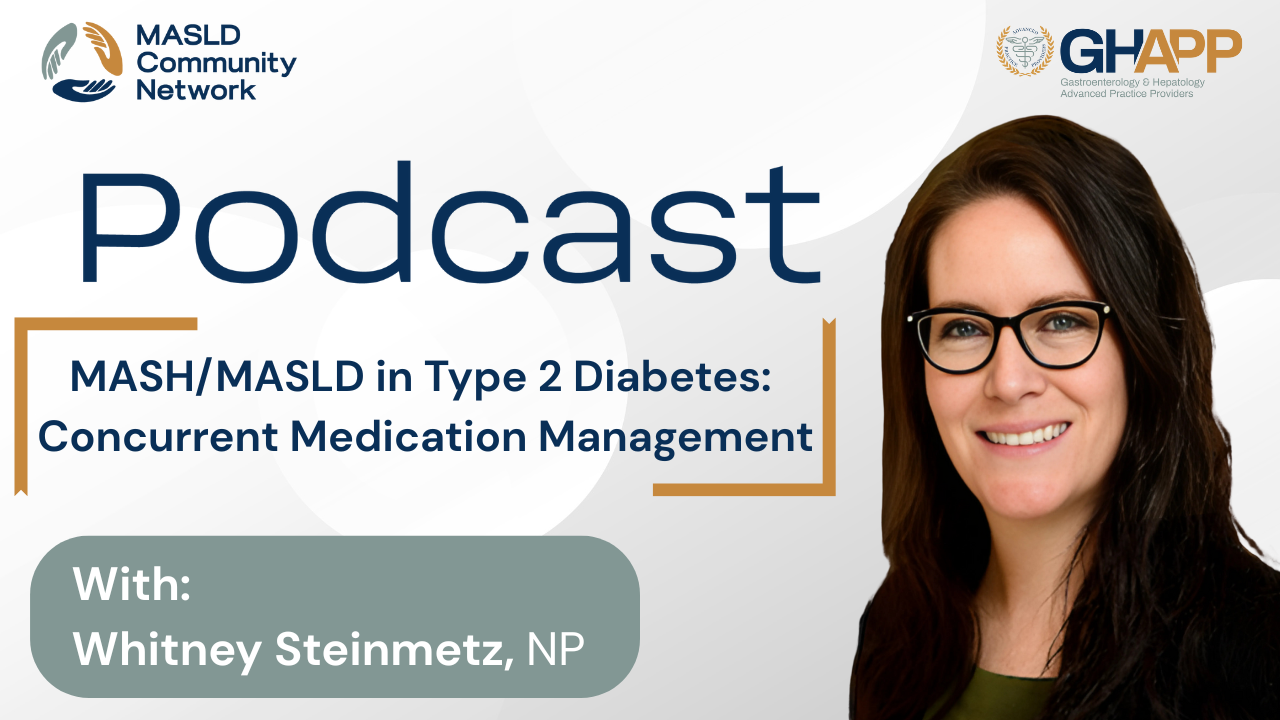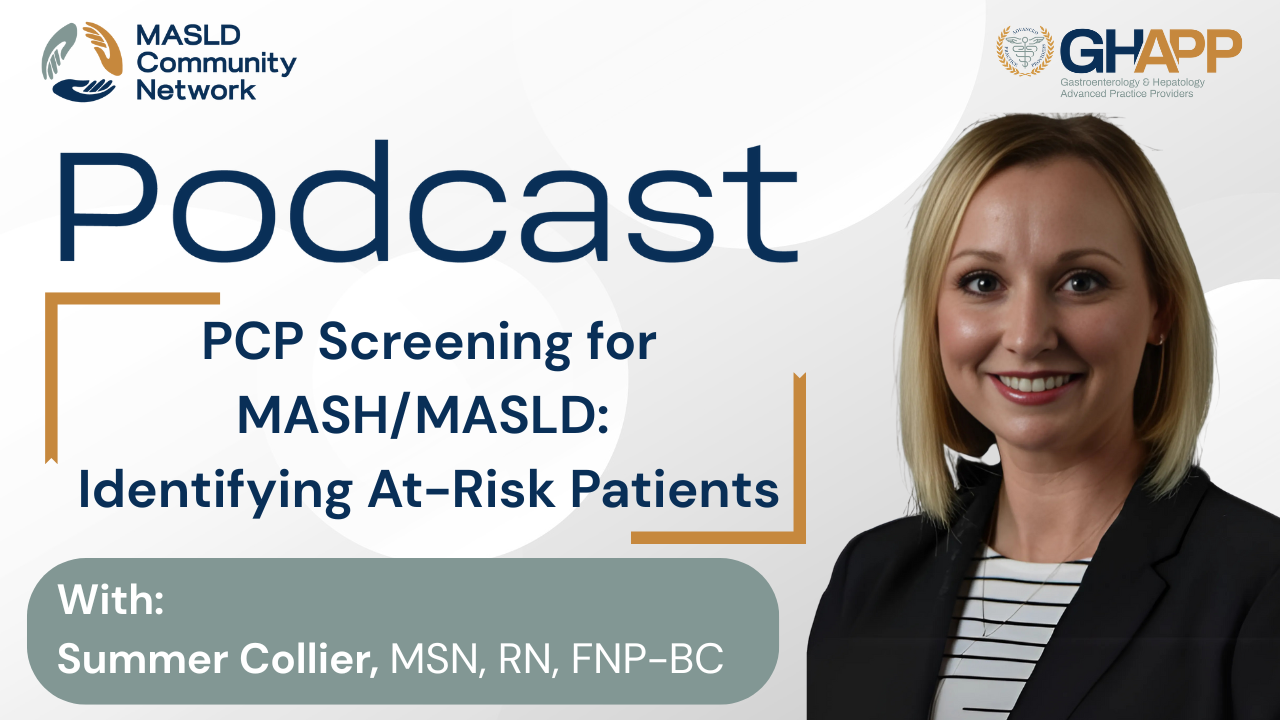
Lisa Richards
MSN, FNP-BC, AF-AASLD
Location : San Diego, CA, USA
BIO
Lisa Richards is a highly experienced Family Nurse Practitioner at the University of California, San Diego Health System. She earned her Bachelor of Science and Master of Science degrees in Nursing, graduating magna cum laude, from the University of San Diego.
With over 22 years of experience in Hepatology, Lisa has developed specialized expertise in MASLD (Metabolic Associated Steatotic Liver Disease) and its related research. She currently serves as the Assistant Director of Clinical Operations at the MASLD Research Center, where she plays a pivotal role in advancing the field.
A dedicated member of the American Association for the Study of Liver Diseases (AASLD), Lisa has been honored with the prestigious title of Associate Fellow, recognizing her excellence and leadership in Hepatology.
In addition to her clinical and research work, Lisa is an active speaker and thought leader in her field. She has presented at esteemed events such as the AASLD Annual Meeting, Global Hepatology and Advanced Practice Providers (GHAPPP), and various local and regional conferences, sharing her deep knowledge and insights into Hepatology.
Known for her leadership and expertise, Lisa Richards is widely regarded as a key figure in advancing MASLD research and Hepatology care.
MASLD-MASH Content Featuring Lisa
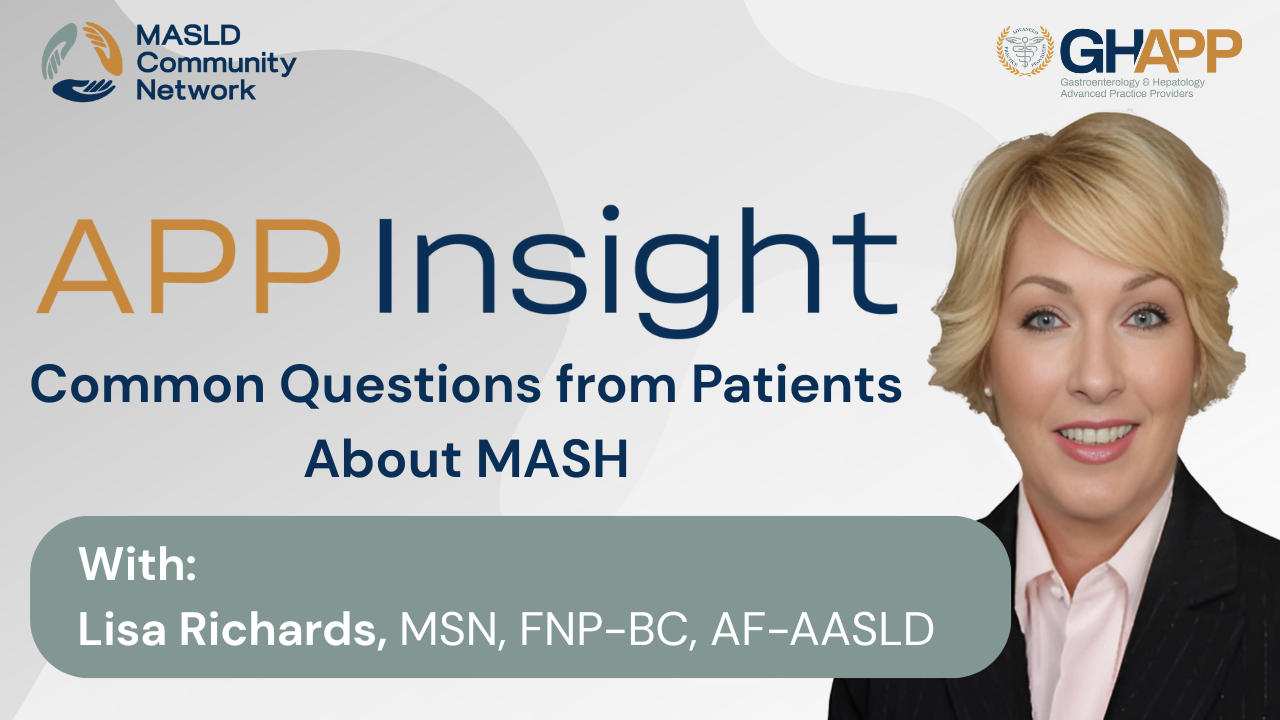
Common Questions From Patients About MASH

In this practical and patient-focused discussion from the GHAPP MASLD/MASH Community Network, we address some of the most frequently asked questions by patients newly diagnosed with MASLD (Metabolic dysfunction-associated steatotic liver disease). Many patients wonder how they can have liver disease if they don’t drink alcohol. This video explains the evolution from NAFLD to MASLD, emphasizing that MASLD is rooted in metabolic risk factors—not alcohol use—and commonly affects individuals with diabetes, obesity, and hypertension. Viewers will also learn about evidence-based lifestyle interventions, including the benefits of a hypocaloric diet, the recommended Mediterranean-style eating pattern, and 150 minutes of weekly physical activity. Finally, we tackle the question “Is MASLD curable?” with empowering guidance on how weight loss and exercise can help reverse liver damage and reduce liver fat. This is a must-watch for clinicians, care teams, and patients seeking clarity and confidence in managing this increasingly common liver disease.
Watch Now

Clinical Deep Dive: Unlocking the Treatment Potential of Rezdiffra

This educational discussion dives into Rezdiffra, the first and only FDA-approved therapy for non-cirrhotic metabolic-associated steatohepatitis (MASH) with moderate to advanced fibrosis. The talk provides a clinical deep dive into the progression of MASH and fibrosis, highlighting the risks of untreated disease and the importance of early intervention. A key focus is the thyroid hormone receptor beta mechanism, explaining how Rezdiffra directly targets liver-specific pathways to reduce hepatic fat accumulation and fibrosis. Additionally, the discussion covers the rigorous FDA approval process and dual efficacy endpoints, detailing how Rezdiffra achieved significant fibrosis improvement and steatohepatitis resolution in the MAESTRO-NASH trial. The session also provides practical insights into patient access, prescribing considerations, and managing common side effects. With over 2,000 patients studied, Rezdiffra has demonstrated a strong safety profile and offers a once-daily oral treatment option that represents a major advancement in MASH management. This discussion is essential for gastroenterologists, hepatologists, and endocrinologists managing patients with MASH, as well as primary care providers and cardiologists who play a role in identifying at-risk individuals. If you are a healthcare professional looking to stay updated on the latest MASH research and treatment strategies, this session provides the insights you need.
Watch Now

Management of Life Style Modification

This video focuses on the comprehensive management of patients with metabolic-associated steatohepatitis (MASH), emphasizing lifestyle modifications, dietary adjustments, and exercise strategies. Key topics include the importance of addressing risk factors like diet, exercise habits, and alcohol intake, as well as referrals to medically supervised weight loss clinics or bariatric surgery for advanced cases. The speaker highlights the benefits of the Mediterranean diet, intermittent fasting, and avoiding ultra-processed foods while discussing the role of resistance training to combat sarcopenia and maintain muscle mass. Practical advice and tailored recommendations ensure a holistic approach to managing MASH and improving patient outcomes.
Watch Now

Third Step of Life Style Management

This video provides a comprehensive overview of emerging pharmacologic treatments for metabolic-associated steatohepatitis (MASH) and their tailored applications based on patient profiles. Topics include FDA-approved therapies, drugs in advanced clinical trials (such as semaglutide and lanifibranor), and the potential for combination treatments targeting both steatohepatitis and fibrosis. The speaker emphasizes the importance of patient-specific approaches considering metabolic profiles, obesity, and diabetes status, alongside lifestyle interventions. Additionally, the video discusses the evolving interdisciplinary care model and highlights the exciting progress in non-invasive testing and treatment advancements for F2-F3 fibrosis.
Watch Now

Approved Medication for MASH/NASH

This video provides detailed guidance on selecting and monitoring patients for emerging therapies targeting advanced fibrosis (F2-F3) in NASH. Key topics include contraindications for patients with cirrhosis, considerations for concomitant medications, and dose adjustments for statins. The video outlines ideal candidates based on specific thresholds for VCTE, MRE, ELF scores, and other non-invasive tests while emphasizing the importance of ruling out portal hypertension and other liver diseases. It also reviews a stepwise monitoring approach, focusing on tolerability at three months and efficacy assessments at six and twelve months, with an emphasis on histologic and non-invasive test improvements.
Watch Now

Types of Diet for the Treatment of MASLD

This video explores comprehensive strategies for managing metabolic-associated steatohepatitis (MASH), focusing on fibrosis risk stratification, lifestyle modifications, and pharmacologic interventions. Learn about dietary recommendations like the Mediterranean diet, exercise guidelines emphasizing resistance training, and the role of intermittent fasting and processed food avoidance. The video also highlights weight loss targets, diabetes management, and emerging therapies such as GLP-1 receptor agonists and bariatric surgery, all aimed at improving liver health and patient outcomes.
Watch Now

NITs to Identify High Risk MASH Patients

Explore advancements in non-invasive diagnostics and risk stratification for liver fibrosis and MASH. This video highlights tools like FIB-4, transient elastography, and innovative scoring systems (e.g., FAST and Agile) to identify and predict outcomes for high-risk patients. Learn about serum biomarkers, updated guidelines, and the role of lifestyle interventions alongside targeted therapies for managing metabolic risks and advancing care in hepatology.
Watch Now
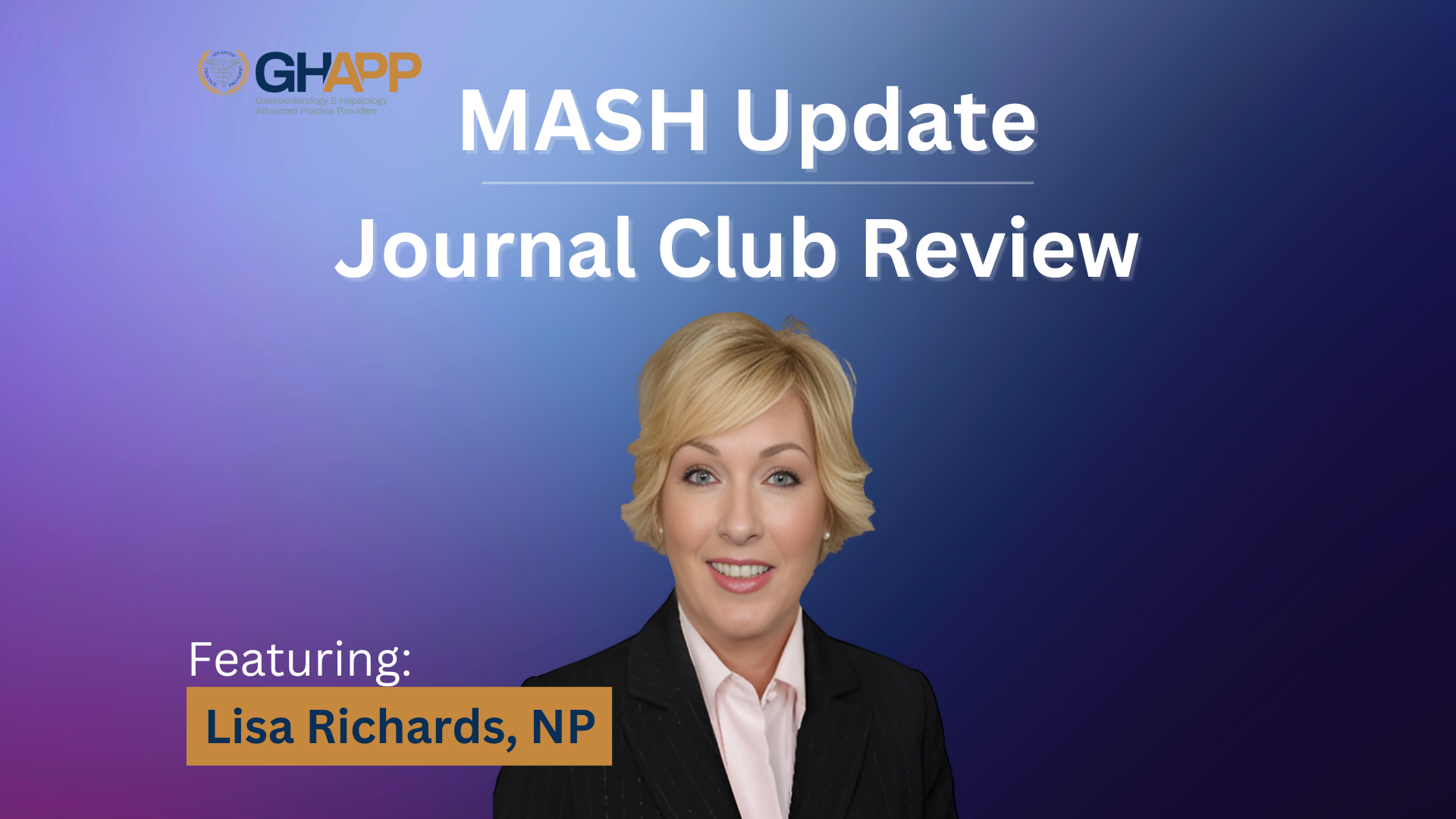
A Phase 3, Randomized, Controlled Trial of Resmetirom in MASH with Liver Fibrosis

Thank you to Madrigal for sponsoring this Journal Club Video Module! In this GHAPP Journal Club review, Lisa Richards, a board-certified family nurse practitioner specializing in hepatology at UC San Diego Health, presents pivotal research from a February 2024 New England Journal of Medicine publication. The phase 3 randomized controlled trial evaluated the efficacy of Resmetirom, the first FDA-approved therapy for non-alcoholic steatohepatitis (NASH) with moderate to advanced liver fibrosis. Lisa discusses key findings from the study, including improvements in liver fibrosis and NASH resolution in patients treated with Resmetirom compared to placebo. Join her for an in-depth look at this groundbreaking therapy and its impact on patient care.
Watch Now

MASH Bootcamp Q&A

In this interactive Q&A session, a panel of liver disease experts discusses key challenges in diagnosing and treating metabolic dysfunction-associated steatohepatitis (MASH) using non-invasive testing and the latest therapeutic advancements. The panel explores the role of FibroScan, ELF scores, and cardiometabolic risk factors in diagnosing fibrosis, especially in patients with limited access to MRI or VCTE-based assessments. They also discuss how serologic testing can be a viable alternative in resource-limited settings and when a liver biopsy may not be necessary for diagnosis. The discussion highlights the FDA approval criteria for Resmetirom, its limitations in F4 patients, and practical strategies for determining treatment eligibility. The experts address real-world challenges, including diagnosing MASH in rural areas, evaluating confounding factors in fibrosis assessment, and ensuring comprehensive liver disease workups to rule out autoimmune conditions.
Watch Now

Identifying & Diagnosing MASH Patients with Non-Invasive Tests

In this informative session, Lisa Richards, NP, a hepatology expert from UC San Diego Healthcare, explores how non-invasive tests (NITs) can effectively diagnose metabolic dysfunction-associated steatohepatitis (MASH) and fibrosis without the need for a liver biopsy. She discusses the role of imaging and blood-based biomarkers, such as FibroScan, MRE, ELF, and FIB-4, in identifying patients with stage 2 or higher liver fibrosis and highlights their clinical applications in real-world settings. Lisa walks through a detailed case study, demonstrating how to interpret non-invasive test results, assess risk stratification, and make confident diagnostic decisions using combined NITs like FAST, MEFIB, and MAST scores. She also addresses key limitations of FibroScan and MRI elastography, including BMI constraints, insurance coverage challenges, and patient-specific factors like claustrophobia. Additionally, Lisa introduces clinical care pathways from leading hepatology organizations, explaining how primary care providers and specialists can collaborate to monitor and manage at-risk MASH patients. She emphasizes that, with modern non-invasive tools, biopsies are no longer necessary for diagnosing most MASH patients, enabling earlier intervention and improved patient outcomes.
Watch Now

HCC Surveillance: Implementation in Patients with Advanced Fibrosis/Cirrhosis from MASH

In this episode of the GHAPP MASLD Community Network podcast, Lisa Richards, a hepatology-focused nurse practitioner in San Diego, shares expert insights on hepatocellular carcinoma (HCC) surveillance for patients with advanced fibrosis and cirrhosis due to MASH (metabolic dysfunction-associated steatohepatitis). Lisa outlines which patients require routine HCC surveillance, emphasizing the importance of staging—particularly stages F3 and F4—and how AASLD guidelines guide surveillance strategies. She discusses recommended surveillance modalities, including ultrasound with AFP every six months, and introduces the LIRADS visualization score to help interpret imaging quality and follow-up needs. Lisa also addresses practical challenges in implementation, from patient education and engagement to overcoming barriers like cost, transportation, and care coordination. For advanced practice providers (APPs), this podcast delivers clear guidance on what to do when new liver lesions are detected and how to proceed with diagnostic imaging and referrals for multidisciplinary review or intervention. Empower your clinical practice with strategies that promote early detection and improve outcomes in patients at risk of HCC.
Watch Now

Differentiating Between F3 and F4

In this comprehensive discussion, HoChong Gilles, a nurse practitioner with 25 years of hepatology experience at the Richmond VA Medical Center, explores the critical importance of accurately distinguishing between F3 (advanced fibrosis) and F4 (cirrhosis) in patients with MASH (metabolic-associated steatohepatitis). While both stages carry increased risks of liver-specific and overall mortality, Gilles explains that F3 may still be reversible with lifestyle changes or pharmacotherapy, whereas F4 signals irreversible liver damage with heightened risk of complications like portal hypertension, hepatic encephalopathy, and liver cancer. Viewers will gain a deeper understanding of how non-invasive tests—like FIB-4, ELF, FibroScan, and MRE—perform in identifying fibrosis stage, including their limitations and overlaps. Gilles also outlines when to consider liver biopsy, especially in cases with discordant test results, atypical features, or clinical uncertainty. This video emphasizes how staging accuracy informs eligibility for therapies, surveillance strategies like HCC screening, and overall prognosis. Learn how to approach this nuanced distinction in clinical practice and why F3 vs. F4 isn't just semantics—it's a turning point in patient care.
Watch Now

Addressing Health Disparities: Equity Considerations in MASH/MASLD Care

In this episode, Patrick Horne, NP at the University of Florida (UF Health), explores the impact of health disparities and socioeconomic inequality on the diagnosis and management of MASH (metabolic-associated steatohepatitis) and MASLD (metabolic dysfunction-associated steatotic liver disease). With a focus on rural and underserved populations, Patrick discusses how limited access to quality healthcare, healthy food, exercise options, and non-invasive testing (NITs) like FibroScan or MRI elastography can delay diagnosis and worsen outcomes. He shares practical, empathetic strategies for individualizing care, such as using accessible tools like FIB-4 or APRI, promoting low-cost physical activity like walking or swimming, and providing culturally sensitive nutrition advice tailored to financial and geographic realities. Patrick emphasizes the provider’s role as a patient advocate and coach, helping patients navigate barriers and create sustainable lifestyle modifications. This episode offers key insights for clinicians working to close gaps in care and promote equity in liver disease management.
Watch Now

Pharmacotherapy Review

Join Christina Hanson, FNP-C, from South Denver Gastroenterology, as she provides an in-depth overview of the current pharmacologic treatment landscape for Metabolic Dysfunction-Associated Steatotic Liver Disease (MASLD) and Metabolic Dysfunction-Associated Steatohepatitis (MASH). This expert-led session explores the three cornerstones of MASH management—lifestyle and weight loss interventions, cardiovascular risk reduction, and liver-directed therapy—while highlighting the evolving role of GLP-1 receptor agonists and the recent FDA approval of resmetirom, the first medication indicated for adults with MASH and moderate to advanced fibrosis. Christina also discusses clinical trial data from MAESTRO-NASH, reviews historical agents like vitamin E and pioglitazone, and offers practical guidance on patient selection, safety considerations, and monitoring strategies. Whether you’re a GI provider, hepatology specialist, or primary care clinician managing fatty liver disease, this video provides valuable insights into how emerging therapies are shaping the future of MASH treatment.
Watch Now

Liver Model Overview

Join Alison Moe, PA-C with United Digestive, as she walks through a hands-on demonstration using a life-sized liver model to help patients better understand fibrosis and liver disease progression. In this engaging and practical overview, Allison explains how different stages of liver fibrosis—from normal liver to cirrhosis and hepatocellular carcinoma—can be felt and visualized using a segmented anatomical model. She shares how this tool enhances patient education during discussions about non-invasive liver testing, such as FibroScan, CAP scores, FIB-4, ELF testing, and more. Designed to support visual learners and improve comprehension of disease state, this video is a valuable resource for clinicians and patients navigating the complexities of metabolic-associated fatty liver disease (MASLD) and its progression to MASH. Learn how tactile and visual teaching aids can bridge the gap between diagnostics and patient understanding in hepatology care.
Watch Now
Related Content
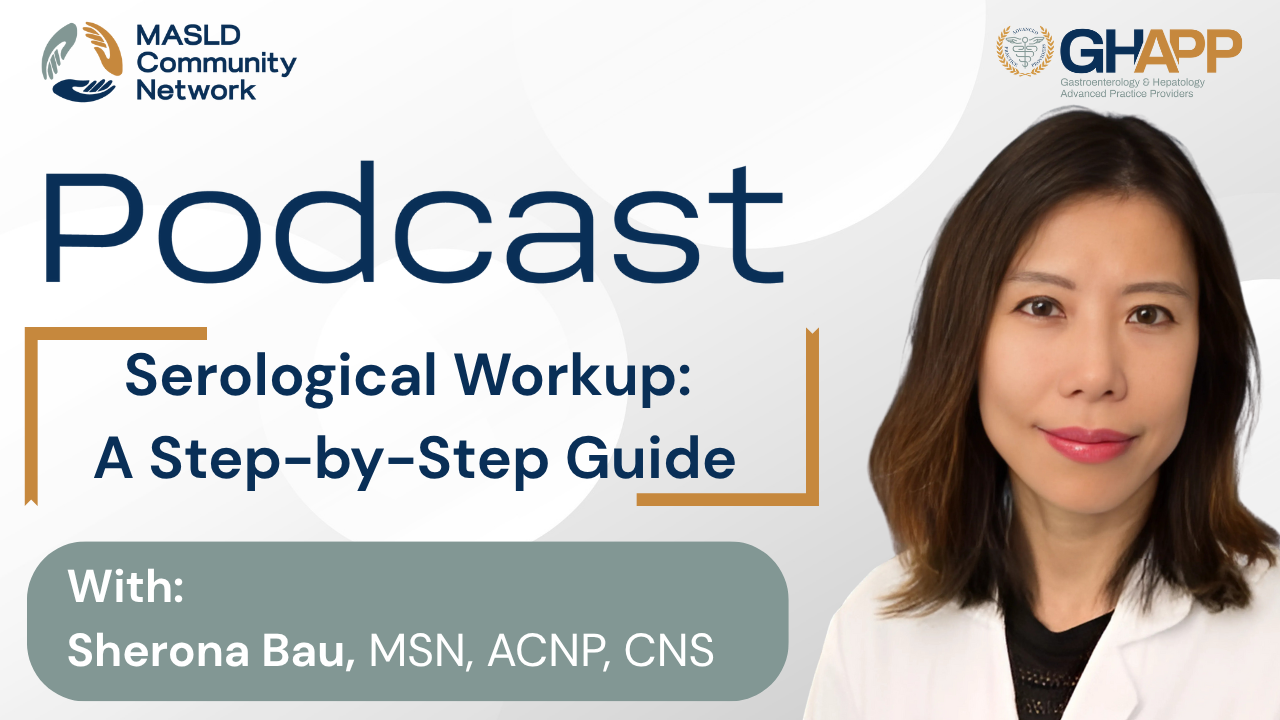
Serological Workup: A Step-by-Step Guide

In this comprehensive video, Sherona Bau, NP from UCLA, breaks down the essential hepatology workup for patients with MASLD (formerly NAFLD) and MASH, offering guidance for both primary care providers and GI/hepatology specialists. Drawing from her extensive clinical experience, she outlines a systematic approach to evaluating abnormal liver ultrasound findings—starting with critical labs to rule out chronic liver conditions like hepatitis B, hepatitis C, autoimmune hepatitis, PBC, and hereditary hemochromatosis. Sherona discusses the importance of ordering ANA, AMA, ferritin, serologies, and even specialized labs like the phosphatidylethanol (PEth) test to uncover alcohol-related liver disease that may be overlooked. She emphasizes the need to screen for cardiometabolic risk factors including type 2 diabetes and dyslipidemia and highlights non-invasive tests such as FibroScan and FIB-4 to help identify patients at risk of advanced fibrosis who may benefit from specialist referral. Most importantly, Sherona addresses the fears many patients face around liver disease progression and life expectancy, encouraging early intervention and coordinated care to improve long-term outcomes. This video is a must-watch for any clinician managing steatotic liver disease.







